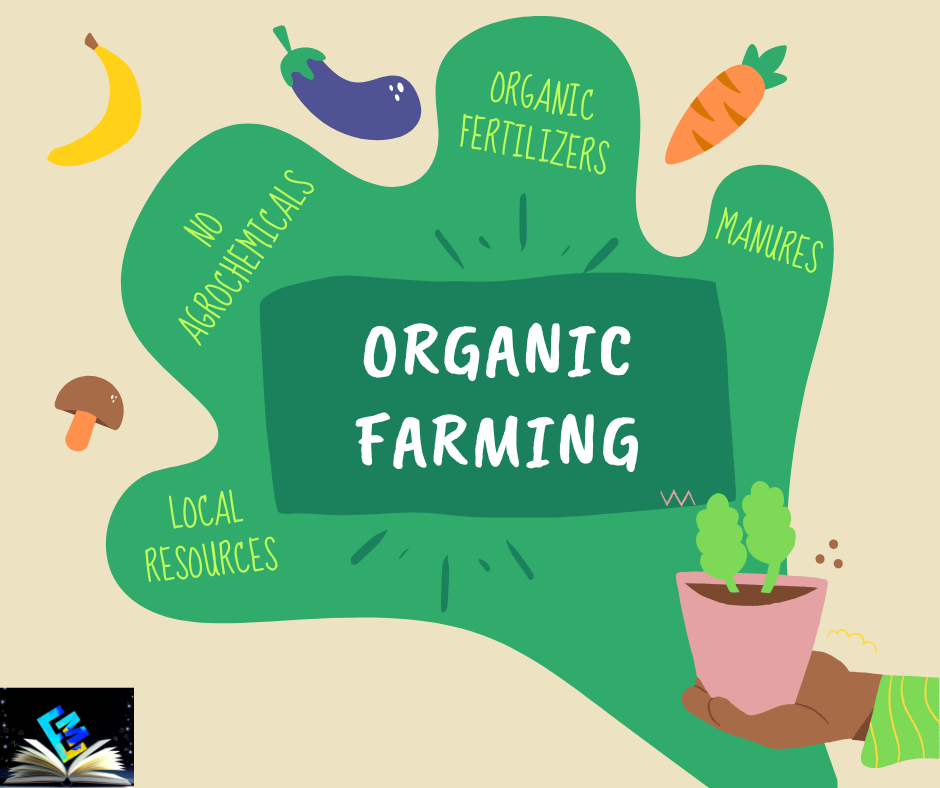
Organic Farming the New Trend?
Keywords: Organic Farming, organic, natural, chemical, plantation, organic food
Introduction to Organic Farming
Organic farming, also known as ecological farming or biological farming, is an agricultural method that uses fertilizers of organic origin such as compost manure, green manure, and bone meal. It emphasizes techniques such as crop rotation and companion planting. Originated early in the 20th century.
Organic farming avoids chemical pesticides and fertilizers and seeks to increase soil fertility by feeding soil micro-life with residues from life such as garbage compost and sewage, manure, plant residues, food processing wastes etc.
Prime Minister Narendra Modi said, “Organic farming is our duty” while addressing the nation on the 75th Independence Day on August 15.
The Prime Minister mentioned organic and natural farming turned into chemical-free agriculture in his speech.
Organic farming is seen as a safer alternative. Chemicals do not find a place in this farming technique. In this method farmers only use organic products such as cow dung. In natural farming, however, no external inputs including bio-fertilisers are used (this includes zero-budget natural farming, which is being encouraged by the Indian government).
This type of farming not only benefits Public Health but also ensures biodiversity. Steps have been taken regularly to promote Organic and Natural Farming through schemes including Paramparagat Krishi Vikas Yojana, Mission Organic Value Chain Development for North Eastern Region under the National Mission for Sustainable Agriculture and more. Organic food production also includes farming techniques that do not use genetically modified organisms, growth hormones, and antibiotics.
Components of Organic Farming
- Organic Manures: Organic materials such as farm yard manure, slurry, compost, straw (crop residues), bio-fertilizers, green manure and cover crops are substituted for inorganic fertilizers. The use of organic manures would also maintain the quality of the environment.
- Biological Pest Management: The conservation of natural enemies of pests is important for avoiding the use of chemical pesticides. Botanical pesticides derived from neem, tobacco and other medicinal plants need popularization. Selective microbial pesticides, for example, Bacillus thuringiensis, offer promise.
- Non-Chemical Weed Control: Mechanical methods of weed control are practised to reduce the weed population. Biological control of weeds needs popularisation.
- Agronomical Practices: Crop rotation, mixed cropping, and green manuring practices improve the physical and chemical properties of soil. The inclusion of leguminous crops in these practices adds to fertility.
- Alley Cropping: The integration of perennial plants (mostly leguminous) in the farming system is called alley cropping.
Principles
- No Chemical Fertilizer: If nature is left to itself, fertility is increased, and organic remains of plants and animals accumulate and are decomposed on the surface by bacteria and fungi. Using a straw, green manure and farmyard manure, one can get high yields without chemical fertilizer.
- No Use of Herbicide: Straw mulch and temporary flooding provide effective weed control in many fields.
- No Use of Pesticides: The conservation of natural enemies of pests and the use of botanical pesticides avoid the use of chemical pesticides.
- Maintenance of Healthy Soil: Soil health is maintained through the cultivation of legumes, green manuring, green leaf manuring, crop rotation, and inter and mixed cropping including legumes.
Advantages of Organic Farming
- It does not result in any environmental pollution because it avoids the use of chemical and plant protection chemicals.
- Less energy is used in this type of farming compared to conventional agriculture.
- Less mechanisation is needed.
- Less soil disturbance, proper structure, and high organic matter content will be maintained.
- Organic food fetches more price than the product obtained by conventional methods.
Barriers
Initially, there may be some barriers which may prevent some of the farmers from adopting this organic farming.
- When changing over to organic farming an initial crop loss generally occurs, particularly if done quickly.
- Land resources can move freely from organic farming to conventional farming; they do not move freely in the reverse direction.
- Biological controls may have been weakened, and it may take three or four years for residues to lose their effect.
Conclusion
Organic farming yields more nutritious and safe food. The popularity of organic food is growing dramatically as consumers seek organic foods that are thought to be healthier and safer. Thus, organic food perhaps ensures food safety from farm to plate.
This farming appears to be sustainable, economic and Eco-friendly. Although switching suddenly to this type of farming is not feasible in a country like India as in such a country the process of food production should be fast.
Author: Tanishka Ranjan
Mail us at edumoundofficial@gmail.com






